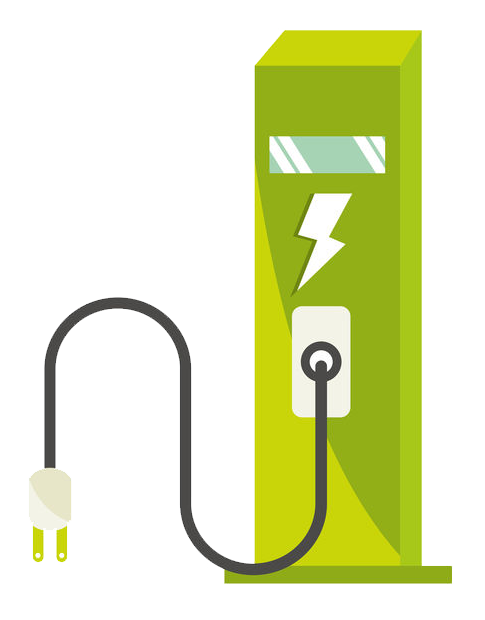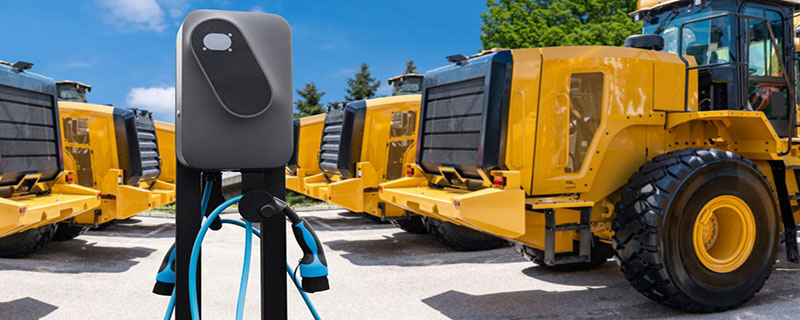The Rise of Electric Vehicles in Construction
The construction industry, like many other sectors, is being profoundly affected by the global shift toward electric vehicles (EVs) and the broader movement away from fossil fuels. As we move toward a more sustainable and environmentally conscious future, the role of EVs in shaping this transformation cannot be overstated. The electrification of vehicles is set to influence not only how construction sites operate but also how the industry as a whole adapts to the challenges and opportunities that this shift presents. In this article, buildingspecifier.com Editor Joe Bradbury explores how the rise of electric vehicles will change the construction industry, considering the move towards battery power, its impact on construction operations, potential benefits, and challenges.
How will electric vehicles change the construction industry?
Electric vehicles have become a symbol of progress in reducing carbon emissions and combating climate change. While much of the focus has been on passenger vehicles, the construction industry is increasingly adopting EVs for both on-road and off-road operations.
Electric construction vehicles, such as excavators, loaders, and cranes, are emerging on the market. These battery-powered machines offer comparable performance to their diesel counterparts but with significant reductions in greenhouse gas emissions and noise pollution. Moreover, electric trucks and delivery vans are becoming common on construction sites, transporting materials in a more environmentally friendly manner.
Positive impacts on the construction industry
Reduction of carbon emissions
One of the most immediate and obvious benefits of electric vehicles in construction is the reduction in carbon emissions. The construction industry is a major contributor to global emissions, and electrifying the vehicle fleet is a critical step towards mitigating this impact. EVs help reduce direct emissions from vehicles and machinery, making construction sites greener and helping companies comply with increasingly stringent environmental regulations.
Governments around the world, particularly in the UK and Europe, are setting ambitious targets for reducing emissions. The construction industry will need to adapt, and adopting EVs is a key part of meeting these goals. As carbon reduction becomes a priority, construction companies that embrace EVs can enhance their green credentials and position themselves as leaders in sustainable practices.
Improved air quality and health benefits
Diesel-powered vehicles and machinery are notorious for emitting pollutants such as nitrogen oxides and particulate matter, which can negatively affect both the environment and human health. On construction sites, where workers are exposed to these emissions on a daily basis, air quality can be a serious concern.
Electric vehicles, by contrast, produce zero tailpipe emissions. This means that construction workers will benefit from cleaner air and improved working conditions. The reduction in harmful pollutants can also contribute to better public health, especially in urban areas where construction activity is frequent and air quality is already compromised.
Noise reduction
Electric vehicles are significantly quieter than traditional internal combustion engine (ICE) vehicles. This can be particularly beneficial on construction sites, where noise pollution is often a major issue. By reducing noise levels, EVs can improve working conditions for construction teams, reduce the need for noise barriers, and make it easier to carry out projects in noise-sensitive areas such as residential neighbourhoods, hospitals, or schools.
In many city centres, regulations are becoming stricter around acceptable noise levels during construction. EVs provide a way to meet these requirements, enabling construction projects to operate more flexibly and with less disruption to local communities.
Cost savings on fuel and maintenance
While the initial cost of purchasing electric construction vehicles and equipment can be higher than traditional diesel-powered models, the total cost of ownership tends to be lower over time. Electric vehicles are more energy-efficient, and the price of electricity is generally lower than that of diesel fuel. Additionally, EVs have fewer moving parts, meaning they require less maintenance and have a longer lifespan compared to ICE vehicles.
This can translate into significant cost savings for construction companies in the long term. As battery technology improves and economies of scale take effect, the upfront cost of electric vehicles will likely decrease, making them more accessible to a wider range of construction businesses.
Challenges and limitations of electric vehicles in construction
While there are many advantages to adopting electric vehicles in the construction industry, there are also several challenges that must be addressed.
 Limited range and charging infrastructure
Limited range and charging infrastructure
One of the main concerns with EVs, particularly for heavy-duty construction vehicles, is range. Battery technology has made significant strides in recent years, but range limitations remain a critical issue for vehicles that are expected to operate for extended periods without downtime.
Construction sites, especially those located in remote or rural areas, may not have the necessary charging infrastructure in place. Charging large electric vehicles, such as trucks or heavy machinery, requires substantial amounts of power, and charging stations may not be readily available in all areas. This lack of infrastructure could slow the widespread adoption of EVs in the construction industry.
Charging times and downtime
While refuelling a diesel vehicle can take just a few minutes, recharging an electric vehicle takes considerably longer. Fast charging technology is improving, but for large construction vehicles, charging times can still be a significant operational challenge. This downtime can lead to productivity losses, particularly on sites where tight project schedules are critical.
For construction companies, this will necessitate careful planning and management of vehicle usage and charging schedules to avoid delays and interruptions. One potential solution is the use of swappable battery systems, allowing vehicles to continue operating while batteries are charged off-site, but this technology is not yet widespread.
Higher initial costs
As mentioned earlier, electric construction vehicles tend to be more expensive upfront than their diesel counterparts. For smaller construction firms with tight budgets, the higher initial investment can be a barrier to adoption. Although long-term savings on fuel and maintenance can offset these costs, the initial financial outlay may still be prohibitive for some companies, particularly in a highly competitive industry with narrow profit margins.
Battery life and sustainability
The sustainability of EVs depends largely on the lifecycle of their batteries. While electric vehicles produce zero emissions during operation, the environmental impact of mining the raw materials for batteries, as well as the disposal of batteries at the end of their useful life, presents new challenges for the industry.
Battery recycling is an emerging field, and more efficient, sustainable methods of recycling and repurposing batteries are being developed. However, until these solutions become mainstream, the environmental benefits of EVs could be undermined by the challenges associated with battery production and disposal.
The shift towards a battery-powered future
The move away from fossil fuels in the construction industry is not limited to vehicles alone. The industry as a whole is experiencing a broader shift towards electrification and renewable energy. Battery-powered tools and equipment are becoming more common on construction sites, offering greater efficiency and lower emissions compared to traditional fuel-powered tools.
Energy storage solutions, such as site-based battery systems, are also gaining traction, enabling construction sites to reduce their reliance on diesel generators and integrate renewable energy sources such as solar or wind power. This shift towards battery power is not only beneficial for the environment but can also improve site efficiency by reducing energy costs and minimising downtime associated with fuel supply issues.
In summary
Electric vehicles are set to play a transformative role in the construction industry, contributing to a more sustainable, efficient, and environmentally responsible future. The transition to battery-powered vehicles and equipment will bring about numerous benefits, including reduced emissions, improved air quality, lower noise levels, and long-term cost savings. However, challenges such as range limitations, charging infrastructure, and the environmental impact of battery production must be carefully managed.
As technology continues to advance and the construction industry adapts to the realities of a low-carbon future, electric vehicles will undoubtedly become an integral part of the industry’s toolkit. Forward-thinking companies that embrace this change now will be well-positioned to thrive in the evolving landscape of sustainable construction.









Leave a Reply
Want to join the discussion?Feel free to contribute!